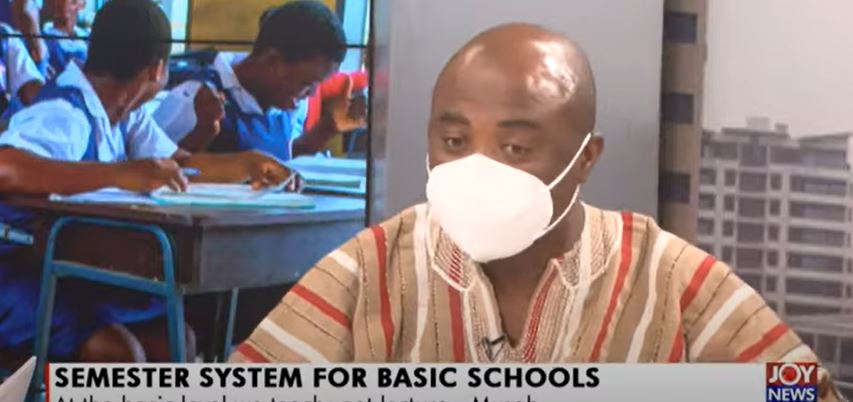The newly-introduced semester-based academic calendar for basic schools in the country has been met with fierce resistance from stakeholders in the educational sector.
Some teacher unions, including the Ghana National Association of Teachers (GNAT), have vowed to kick against its implementation should the government refuse to withdraw it immediately for broader consultations.
GNAT believes the policy is dead on arrival and has blamed the Ghana Education Service (GES) for violating a collective agreement between the stakeholders.
Speaking on JoyNews’ AM Show on Tuesday, the General Secretary of GNAT, Thomas Musah, said the new system is flawed and fails to meet standard.
“This particular [semester] thing is dead on arrival, it is dangerous. It is dangerous to introduce a semester system at the KG level. I am speaking from a professional point of view and as a practitioner. I have taught at every level from KG till I became head teacher.
“At the basic level, we teach, we don't lecture. And if you look at UNICEF's own concept of teaching and learning, they have what we call learning through play. You don't lecture somebody at KG level. It is an activity oriented. The principle there is that it is child-centred learning and UNICEF is promoting it,” he told host, Benjamin Akakpo.
The GES earlier introduced a new semester system in the quest to help reduce congestion in basic schools, ease pressure on teachers and help align academic calenders.
Under this module, students will spend 40 weeks in an academic year, instead of the usual 52 weeks.
But Ranking Member on Parliament's Education Committee, Peter Nortsu-Kotoe has backed calls for the Education Ministry and GES to withdraw the policy.
In an interview on the same show, he added that the Education Committee in Parliament supports the position.
“If one teacher is going to handle a class from 7.30am to 3.30pm, how does he get home and prepare for the next day? Even at the tertiary level, they do 16 weeks. To me, this arrangement is professionally wrong and not workable. The Ministry must resolve it."
“We don't even have the resources to do this. We have poorly ventilated schools and some students have to carry chairs to school to learn. And they'd be uncomfortable for long hours. It's not proper to keep the children in that environment for long,” he stressed.
Latest Stories
-
Photos: Ghana defeat Niger to finish third in WAFU-B U20 Boys Cup
4 minutes -
Star Assurance signs up for JoySports Invitational Tournament
15 minutes -
Indigenous firm Duytlex partners with Petro-Canada Lubricants to expand footprint in Africa
16 minutes -
JAPTU Ghana pays courtesy call on IGP Yohuno, POMAB members
30 minutes -
The healers who were left behind: A tale from Nunyãdume
1 hour -
Telecel bridging digital divide through KNUST SONSOL Programme
1 hour -
2025 Mid-Year Budget: Trade expert calls for single-digit inflation to strengthen economy
1 hour -
From Doubt to Dreams: Telecel’s 2Moorch Money Promo changes a nurse’s life
1 hour -
A strong cedi that Ghana does feel – policy and market behaviour
1 hour -
GIPC facilitates 2,000 jobs following milestone aftercare intervention
1 hour -
2025 Mid-Year Budget: Economy is on steady course – Trade Expert
2 hours -
Stanbic Investment Management Services Ltd announces strong 2024 performance
2 hours -
Banking is necessary, but banks are not: Ghana’s digital finance disruption story
2 hours -
Ghana set to sign bilateral debt agreements today under G-20 framework
2 hours -
Gov’t narrows fiscal deficit target after better-than-expected first half
2 hours

